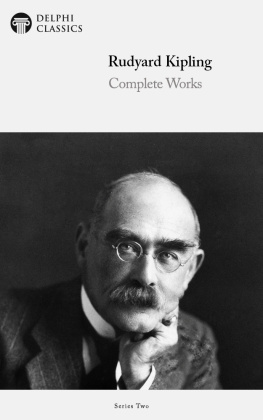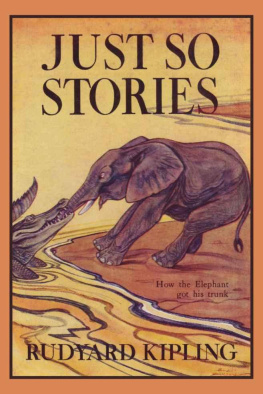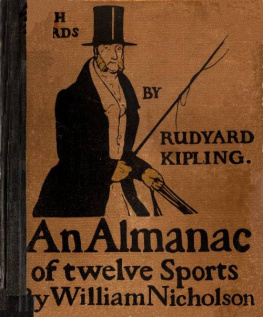Rudyard Kipling - France at War
Here you can read online Rudyard Kipling - France at War full text of the book (entire story) in english for free. Download pdf and epub, get meaning, cover and reviews about this ebook. year: 2014, publisher: epubBooks Classics, genre: Non-fiction / Prose. Description of the work, (preface) as well as reviews are available. Best literature library LitArk.com created for fans of good reading and offers a wide selection of genres:
Romance novel
Science fiction
Adventure
Detective
Science
History
Home and family
Prose
Art
Politics
Computer
Non-fiction
Religion
Business
Children
Humor
Choose a favorite category and find really read worthwhile books. Enjoy immersion in the world of imagination, feel the emotions of the characters or learn something new for yourself, make an fascinating discovery.

- Book:France at War
- Author:
- Publisher:epubBooks Classics
- Genre:
- Year:2014
- Rating:4 / 5
- Favourites:Add to favourites
- Your mark:
- 80
- 1
- 2
- 3
- 4
- 5
France at War: summary, description and annotation
We offer to read an annotation, description, summary or preface (depends on what the author of the book "France at War" wrote himself). If you haven't found the necessary information about the book — write in the comments, we will try to find it.
France at War — read online for free the complete book (whole text) full work
Below is the text of the book, divided by pages. System saving the place of the last page read, allows you to conveniently read the book "France at War" online for free, without having to search again every time where you left off. Put a bookmark, and you can go to the page where you finished reading at any time.
Font size:
Interval:
Bookmark:
France at War
On the Frontier of Civilization
Rudyard Kipling
France
By Rudyard Kipling
Broke to every known mischance, lifted over all
By the light sane joy of life, the buckler of the Gaul,
Furious in luxury, merciless in toil,
Terrible with strength that draws from her tireless soil,
Strictest judge of her own worth, gentlest of men's mind,
First to follow truth and last to leave old truths behind
France beloved of every soul that loves its fellowkind.
Ere our birth (rememberest thou?) side by side we lay
Fretting in the womb of Rome to begin the fray.
Ere men knew our tongues apart, our one taste was known
Each must mould the other's fate as he wrought his own.
To this end we stirred mankind till all earth was ours,
Till our worldend strifes began wayside thrones and powers,
Puppets that we made or broke to bar the other's path
Necessary, outpost folk, hirelings of our wrath.
To this end we stormed the seas, tack for tack, and burst
Through the doorways of new worlds, doubtful which was first.
Hand on hilt (rememberest thou?), ready for the blow.
Sure whatever else we met we should meet our foe.
Spurred or baulked at ev'ry stride by the other's strength,
So we rode the ages down and every ocean's length;
Where did you refrain from us or we refrain from you?
Ask the wave that has not watched war between us two.
Others held us for a while, but with weaker charms,
These we quitted at the call for each other's arms.
Eager toward the known delight, equally we strove,
Each the other's mystery, terror, need, and love.
To each other's open court with our proofs we came,
Where could we find honour else or men to test the claim?
From each other's throat we wrenched valour's last reward,
That extorted word of praise gasped 'twixt lunge and guard.
In each other's cup we poured mingled blood and tears,
Brutal joys, unmeasured hopes, intolerable fears,
All that soiled or salted life for a thousand years.
Proved beyond the need of proof, matched in every clime,
O companion, we have lived greatly through all time:
Yoked in knowledge and remorse now we come to rest,
Laughing at old villainies that time has turned to jest,
Pardoning old necessity no pardon can efface
That undying sin we shared in Rouen marketplace.
Now we watch the new years shape, wondering if they hold
Fiercer lighting in their hearts than we launched of old.
Now we hear new voices rise, question, boast or gird,
As we raged (rememberest thou?) when our crowds were stirred.
Now we count new keels afloat, and new hosts on land,
Massed liked ours (rememberest thou?) when our strokes were planned.
We were schooled for dear life sake, to know each other's blade:
What can blood and iron make more than we have made?
We have learned by keenest use to know each other's mind:
What shall blood and iron loose that we cannot bind?
We who swept each other's coast, sacked each other's home,
Since the sword of Brennus clashed on the scales at Rome,
Listen, court and close again, wheeling girth to girth,
In the strained and bloodless guard set for peace on earth.
Broke to every known mischance, lifted over all
By the light sane joy of life, the buckler of the Gaul,
Furious in luxury, merciless in toil,
Terrible with strength renewed from a tireless soil,
Strictest judge of her own worth, gentlest of men's mind,
First to follow truth and last to leave old truths behind,
France beloved of every soul that loves or serves its kind.
I
On the Frontier of Civilization
"It's a pretty park," said the French artillery officer. "We've done a lot for it since the owner left. I hope he'll appreciate it when he comes back."
The car traversed a winding drive through woods, between banks embellished with little chalets of a rustic nature. At first, the chalets stood their full height above ground, suggesting teagardens in England. Further on they sank into the earth till, at the top of the ascent, only their solid brown roofs showed. Torn branches drooping across the driveway, with here and there a scorched patch of undergrowth, explained the reason of their modesty.
The chateau that commanded these glories of forest and park sat boldly on a terrace. There was nothing wrong with it except, if one looked closely, a few scratches or dints on its white stone walls, or a neatly drilled hole under a flight of steps. One such hole ended in an unexploded shell. "Yes," said the officer. "They arrive here occasionally."
Something bellowed across the folds of the wooded hills; something grunted in reply. Something passed overhead, querulously but not without dignity. Two clear fresh barks joined the chorus, and a man moved lazily in the direction of the guns.
"Well. Suppose we come and look at things a little," said the commanding officer.
AN OBSERVATION POST
There was a specimen treea tree worthy of such a parkthe sort of tree visitors are always taken to admire. A ladder ran up it to a platform. What little wind there was swayed the tall top, and the ladder creaked like a ship's gangway. A telephone bell tinkled 50 foot overhead. Two invisible guns spoke fervently for half a minute, and broke off like terriers choked on a leash. We climbed till the topmost platform swayed sicklily beneath us. Here one found a rustic shelter, always of the teagarden pattern, a table, a map, and a little window wreathed with living branches that gave one the first view of the Devil and all his works. It was a stretch of open country, with a few sticks like old toothbrushes which had once been trees round a farm. The rest was yellow grass, barren to all appearance as the veldt.
"The grass is yellow because they have used gas here," said an officer. "Their trenches are. You can see for yourself."
The guns in the woods began again. They seemed to have no relation to the regularly spaced bursts of smoke along a little smear in the desert earth two thousand yards awayno connection at all with the strong voices overhead coming and going. It was as impersonal as the drive of the sea along a breakwater.
Thus it went: a pausea gathering of sound like the race of an incoming wave; then the highflung heads of breakers spouting white up the face of a groyne. Suddenly, a seventh wave broke and spread the shape of its foam like a plume overtopping all the others.
"That's one of our torpilleurswhat you call trenchsweepers," said the observer among the whispering leaves.
Some one crossed the platform to consult the map with its ranges. A blistering outbreak of white smokes rose a little beyond the large plume. It was as though the tide had struck a reef out yonder.
Then a new voice of tremendous volume lifted itself out of a lull that followed. Somebody laughed. Evidently the voice was known.
"That is not for us," a gunner said. "They are being waked up from" he named a distant French position. "So and so is attending to them there. We go on with our usual work. Look! Another torpilleur."
"THE BARBARIAN"
Again a big plume rose; and again the lighter shells broke at their appointed distance beyond it. The smoke died away on that stretch of trench, as the foam of a swell dies in the angle of a harbour wall, and broke out afresh half a mile lower down. In its apparent laziness, in its awful deliberation, and its quick spasms of wrath, it was more like the work of waves than of men; and our high platform's gentle sway and glide was exactly the motion of a ship drifting with us toward that shore.
Font size:
Interval:
Bookmark:
Similar books «France at War»
Look at similar books to France at War. We have selected literature similar in name and meaning in the hope of providing readers with more options to find new, interesting, not yet read works.
Discussion, reviews of the book France at War and just readers' own opinions. Leave your comments, write what you think about the work, its meaning or the main characters. Specify what exactly you liked and what you didn't like, and why you think so.












